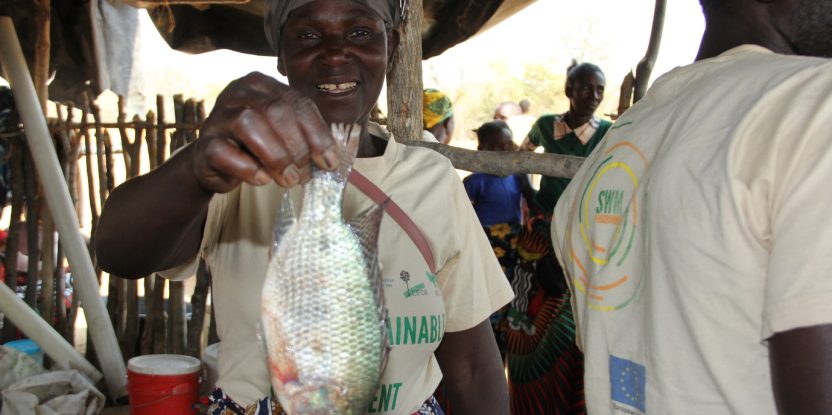
Sustainable fishing practices present an environmental solution and a powerful opportunity for advancing gender equality. In Nyawa, Zambia, a fish farming programme transforms lives, particularly for women, by fostering equality and empowering them as stewards of their communities and the environment.
For generations, the people of Nyawa relied on hunting as a cornerstone of survival. Yet, as population pressures mounted and forest resources dwindled, illegal hunting surged, threatening both wildlife and livelihoods. Charles Mwaanga, Vice Chairperson of the Nyawa Village Management Committee, reflected on the damaging past. “I wasn’t wise in my younger years,” Mwaanga said. “Poaching was a normal practice—an ancestral tradition we followed.”
Today, in a striking departure from this legacy, the people of Nyawa Chiefdom are pioneering a sustainable future through fish farming. With support from the Sustainable Wildlife Management (SWM) Programme, the Sianyongo Fish Farming Cooperative (SFFC) is leading a quiet revolution, offering fresh sources of protein, stabilising food security, and, crucially, empowering women to step into leadership roles and reshape traditional gender dynamics.
A sustainable alternative
The SWM Programme offered a lifeline to Nyawa, introducing fish farming as a viable alternative to hunting. With six thriving fishponds, the SFFC has created a booming local economy, reducing reliance on wild meat while promoting ecological sustainability. Notably, the involvement of women in this enterprise has been pivotal to its success.
The cooperative’s fish harvests have steadily increased, with thousands of Nile tilapia ready for market. Fish sales increased during the most recent harvest, underscoring the project’s economic viability. “This initiative is not only enhancing our food security,” Chief Nyawa, the community leader, noted, “but it is also uniting our community in conservation efforts, with women playing an essential role.”

Abigail Sinyama attributes gender inclusion to the growing success of the SFFC. Photo by Lydia Amanzi/CIFOR-ICRAF
Women at the forefront of change
Gender equality is not just a goal but a driving force behind the SFFC. Women are actively involved in every stage of the process—from pond management to the sale of fish—breaking barriers in what was once a male-dominated sector. Abigail Sinyama, a cooperative member and resource monitor with the SWM Programme, has become a symbol of this transformation.
“Women are being empowered through this programme,” Sinyama shared. “Our involvement in wildlife and forest conservation has given us self-confidence. The men in our community have been incredibly supportive, encouraging us to participate, even in the most physically demanding tasks like digging ponds.”
The success of the fish farming project reflects the community’s strong commitment to sustainable practices. “This initiative is providing our community with an alternative to protein and enhancing food security,” Chief Nyawa stated during a recent fish harvest event. “I am delighted to see the progress the cooperative has made.”

SWM Zambia site coordinator, Griffin Shanungu highlighted the SWM programme’s commitment to conserving natural resources and ensuring sustainable long-term benefits for the community. Photo by Lydia Amanzi/CIFOR-ICRAF
A brighter, more equal future
The fish farming project has not only strengthened food security and reduced the demand for wild meat but has also yielded significant ecological benefits. The community is paving the way for a more sustainable future through effective natural resource management and wildlife protection.
“Establishing a community conservancy and eEnterprises in fish farming and beekeeping is critical to conserving our natural resources,” said Griffin Shanungu, SWM Programme site coordinator for Zambia and an ecologist at CIFOR-ICRAF. “Without these efforts, resource depletion will negatively impact the rich biodiversity of the chiefdom.”
In 2022, the SWM Programme in Nyawa began supporting the cooperative by establishing six seasonal fishponds, funded at a cost of 270,000 ZMW. This initiative aims to improve the supply of alternative protein and reduce the demand for wild meat while contributing to food security.
During the most recent harvest in July 2024, the cooperative yielded over 800 kilograms of fish, generating 40,000 ZMW in revenue.
Lemmy Mwanachikwete, a fishery technician from the Department of Fisheries, acknowledged the improvement in the cooperative’s fish management but pointed out an area for further growth.
“The main challenge this time was the sex reversal of fingerlings, which wasn’t fully effective,” he said. “ This is something we can assist with.”
It is estimated that over 10,000 people in Nyawa, many women, benefited from the harvest. They gained access to fresh fish and improved their household nutrition, which is especially vital during the current drought. The excess fresh fish will be dried and sold to ensure nothing goes to waste.
The Nyawa community’s shift from poaching to fish farming highlights the impact of locally-led efforts and their potential for sustainable change. By embracing new practices and working together, the people of Nyawa are creating a brighter future for themselves and generations to come.
__________________________________________________________
About SWM Programme
The Kavango–Zambezi Transfrontier Conservation Area (KAZA TFCA) is the world’s largest transfrontier conservation area, spanning the international borders of five countries in Southern Africa. The KAZA-TFCA is home to an incredible diversity of landscapes, communities, wildlife and a mosaic of protected areas. However, habitat fragmentation, recurring droughts, human-wildlife conflict and poaching threaten these fragile ecosystems.
To address these challenges, the global SWM Programme supports establishing and strengthening community conservancies to improve land-use planning, community livelihoods and sustainable wildlife management. This initiative, known as the SWM Community Conservancy Project, is being implemented in Botswana, Namibia, Zambia and Zimbabwe.
We want you to share Forests News content, which is licensed under Creative Commons Attribution-NonCommercial-ShareAlike 4.0 International (CC BY-NC-SA 4.0). This means you are free to redistribute our material for non-commercial purposes. All we ask is that you give Forests News appropriate credit and link to the original Forests News content, indicate if changes were made, and distribute your contributions under the same Creative Commons license. You must notify Forests News if you repost, reprint or reuse our materials by contacting forestsnews@cifor-icraf.org.